- Home
-
Overview
- Study Guide
- The Single Most Important Idea
- Mission Statement
- War Is Not Inevitable keynote speech
- Capstone Essay: "To Abolish War"
- An Action Plan
- The Nine Cornerstones
- How Far We Have Already Come
- The Secret Ingredient
- The Vision Thing
- How Long It Will Take
- What You Can Do
- The AFWW Logo Explained
- Examples of War Expenses
- Biological Differences
- What Makes People Happy
- Map of Non-warring Cultures
- Cornerstones
- Videos
- Books
- Blog
- Project Enduring Peace
- About
- Related Projects
- Contact
|
Recently, in an exchange with talk show host Barry F. Seidman (Equal Time for Freethought; WBAI-NY), who describes himself as a secular humanist, the subject of paradigm shift came up. The host is an advocate of libertarian-socialism (anarchism), a good man who envisions a future for our species much like that envisioned by AFWW: egalitarian, just, less violent, ecologically sustainable, and free of war. He sees us trapped in endless cycles of war, polluting and denuding our environment at a perilous rate, and challenged by the juggernaut of global warming. In other words, like most well-read and broadly-informed people, he sees the mess we've gotten ourselves into. When questioned by me about whether or not he used his voice, via his radio program and interviews with experts, to encourage the global empowerment of women as rapidly as possible in order to achieve his vision, his response was, No. "Unless we change the current capitalist system, adding more women to government won't make any difference." Ah, I thought, this very enlightened man of good will, like most men, women, well-meaning organizations, and governments, has it the wrong way 'round. Let me explain. Maybe you agree with him. Maybe you also feel that to fix what's wrong with us, other issues command first priority. You may agree with him that the crucial focus is to change "the system," and then there will be time to get more women involved. 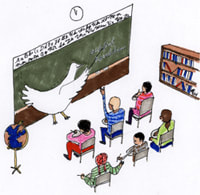 Or perhaps you feel the place to start is by teaching people, young and old, one person at a time, how to resolve their conflicts nonviolently, how to live in peace as a daily practice. When we do that, the assumption seems to be, men everywhere, even those in the Muslim world, will then peacefully accept women as equals and will embrace women as full partners, in our homes, governments, and in global decision-making.  Or maybe you feel that paradigm shift necessitates tackling the war industry head-on, ending the use of land mines, cluster bombs, and nuclear weapons—and working forward from there. Or maybe your focus is on ending poverty. Or spreading the enlightenment and freedom that comes with liberal democracy. In other words, you too may think that empowering women is a good thing, but something that can wait until after we fix the really important problem/s, after we fix the really big barriers to positive change in human history. Consider what could be called "another inconvenient truth," one about our fundamental biology: fine-tuning the structures of governments and other strategies will solve none of the global problems that now menace humanity on an epic scale until certain essential biologically-based concepts are a part of that process. The inconvenient truth is that unless we empower women globally—create parity governance by putting a critical mass of educated, independent women into critical decision-making positions, locally, nationally, and globally—we will remain locked in the embrace of male biology. That fact will doom us to problems that will only play out in ever-mushrooming proportions, no matter what form of government evolves.  Hammurabi and his Law Code Hammurabi and his Law Code What does this mean, locked in the embrace of male biology? It expresses the fact that for all of recorded history—meaning human history that has been written down—men have overwhelmingly been the leaders of our lives. (i) What we're talking about is the major sweep of history, during which men have set up the forms of government we've tried. Men have decided our laws, they've made our treaties. 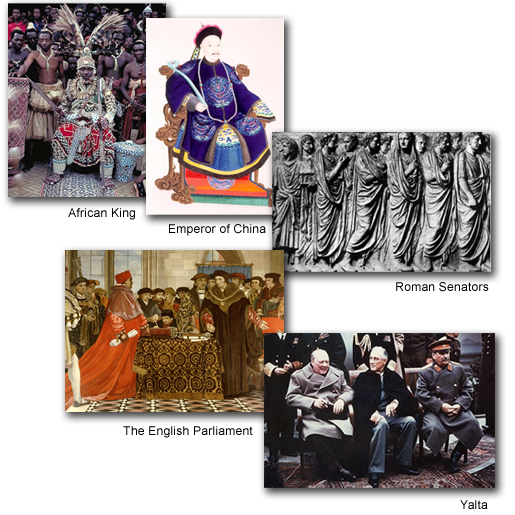 Men have decided whether and when to make war.  Men have founded and run the dominant religions. In short, in areas of politics, law, conflict, and religion we have been embraced from cradle to grave overwhelmingly by male priorities that demonstrably spring from male biological proclivities. Why will women make a difference? Because when it comes to conflicts and to decision- and choice-making, women are motivated by some built-in behavior that is critically different from the built-in behavior of men: women, as it turns out, are the natural allies of nonviolence, the supporters of social stability. Quite the opposite of what the radio talk-show host assumes, the sooner we empower women, the quicker we can accomplish positive changes in a wide range of problem areas. There have been many movements, throughout our long experiment with civilization, to create Utopia, by whatever name. These efforts, however, were virtually always attempted without sharing of power by men and women. As a result, what we see around us is the end product essentially of the unrestrained social expression of basic male biology as it plays out in male priorities. There is a great deal of evidence to support this discomforting statement, which I and others have researched and written about extensively. Dr. Hand, through AFWW, speaks and writes repeatedly about male biology vs. female biology. To what is it referring? For a full explanation, see the book War and Sex and Human Destiny (available at Amazon.com. The full text is also available FREE at Dr. Hand's personal website)." For a brief introduction of relevant male/female differences see the essay "Biological Differences between Men and Women with Respect to Physical Aggression and Social Stability."  Jesus of Nazareth Jesus of Nazareth For our purpose here, let's whet this cutting blade of a concept against the grindstone of human endeavor and its sporadic attempts at transcending its own "inhumanity." Over 2,000 years ago, the teachings of Jesus of Nazareth on nonviolence and equality, had they not been co-opted by a religion run solely by men, might have brought that liberating paradigm shift to us. The Gnostic Gospels indicate that early Christians fully embraced women in positions of leadership along with men. That egalitarianism, however, didn't survive. In the intervening years since the carpenter of Nazareth, other men and movements (e.g., the French Cathars, the Anabaptists) who are lesser knowns also taught the values of equality and nonviolence, and their movements too were obliterated, co-opted, or rendered obscure. 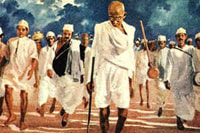 Mohandas Gandhi - Salt March Mohandas Gandhi - Salt March Due in no small part to a movie by the director Richard Attenborough called Gandhi, quite a few people know this Indian spiritual leader's name. Though the vast majority of people have no idea how Gandhi actually worked or the full range of what he stood for, they know he stood for nonviolent social transformation. But Gandhi wanted his country, India, to be a shining light of tolerance. He worked hard to get his countrymen to eliminate the caste system and give women equality. Unfortunately his cause failed to deliver his ultimate vision. India did not become a shining light. Instead it descended into brutal sectarian violence and the separation of India into two countries, separated by religious hatred, the continuation of the caste system, and the continued dreadful treatment of the vast majority of women. [Yes, there is improvement. At this writing, for example, the Indian Ambassador to the United States is a woman. But this increased participation of women is still so miniscule as to be totally ineffective when it comes to governing India.] 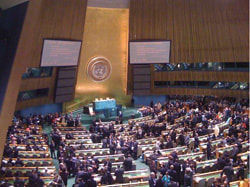 United Nations General Assembly United Nations General Assembly The League of Nations was an attempt to end the violence of war. It died a fairly rapid death. The United Nations—for many years the leadership of which was and virtually still is all male—followed. While we still have a United Nations that does many good things, it has in no way brought about any significant paradigm shift. We still live with inequality, poverty, violence, a deteriorating environment, and war. It remains fundamentally a patriarchy. When considered biologically, the differences between men and women that relate to the creation of social structures, leadership, and conflict resolution are not hard to understand. When one finally sees them, the response tends to be, "Well, of course." The emotions underlying and motivating the decisions people make have been shaped by previous millennia of evolution, not just of our human ancestors but species of primates that came before us. Very deeply embedded traits have come down to us during the long years in humanity's primeval past and they continue to influence our choices, as individuals and as groups. So when it comes to using violence to resolve conflicts, when it comes to using power to improve personal social status, or instead to improve life in the community, men as a group choose differently than do women as a group. Ten thousand years of recorded history, then, documents for us the product of male decisions.  Men spend a good part of their days and emotional energy trying to rise in their dominance hierarchy, or to avoid losing status. Men are geared toward enforcing or changing the social order to increase their status if possible. This cannot be overemphasized. And in cultures where physical aggression isn't systematically suppressed and eschewed, men may sometimes use fighting as one means.  Women (in general) are much more oriented toward social stability—a trait that fosters choices for peace and nonviolence. For women, overturning the social order using violent means so they can rise in status and dominate others lacks appeal. Some methods women use to establish hierarchies are aggressive, such as putting someone down, back-biting, and ostracism, but compared to men, rarely does it include physical aggression. When given power or money, women focus more on creating a stable community by bettering conditions where they live. If you doubt this, ask the leaders of some powerful agents of social change why they prefer to deal with women. Ask the Heifer Foundation, which although it stresses working with both men and women to improve community conditions, finds that including women is essential for success. Or Muhammad Yunis, who was awarded a Nobel Peace Prize for giving out micro-loans. "Soon we saw that money going to women brought much more benefit to the family than money going to the men. So we changed our policy and gave a high priority to women. As a result, now 96% of our four million borrowers in Grameen Bank are women." - Muhammad Yunis Many stability-fostering preferences that evolution has built into women are ones related directly or indirectly to avoiding or resolving social conflicts. Women, much more characteristically than men, prefer negotiation, compromise, finding cooperative ways to meet as many needs of as many people as possible so that violence does not arise. 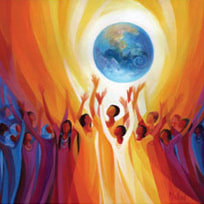 Women also use foresight much more consistently to head off conditions that might result in serious conflicts. If you seek details, here are five references where you can begin your search: Fisher, Hand, Kristoff & WuDUNN, Myers, Wilson. (ii) The bottom line, then, is that if we truly want to foster a major paradigm shift toward a less violent, more stable, more egalitarian future, if we're genuinely serious about this vision and not simply dreaming out loud, then educating and empowering independent women is the first thing we should focus on. It's a grave error to relegate it to some afterthought, or something we just assume will happen when men, who are still making the BIG decisions, finally put other things in order—something men have NEVER achieved before, in spite of many attempts and very good intentions. In fact, in a great many ways they've rather steadfastly resisted adopting biologically-based female priorities, like compromise and equal sharing, for fear of being perceived as weak.  The dove on the cover of my book Women, Power, and the Biology of Peace holds entwined male and female symbols. The positive changes we want to make will only materialize and then persist to the extent that we establish gender parity in governing. Because of their biology, empowered women are the catalyst and the key to that better future. Can we be masters of our fate, creators of a just, egalitarian, and warless future? Why not? The human capacity for change, for innovation, for survival, is profound. In the developed world, women are already taking their place beside men who are seeking positive change 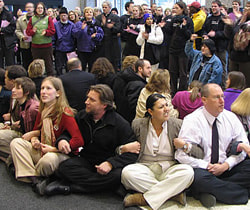 Civil Disobedience - Nonviolent Direct Action Civil Disobedience - Nonviolent Direct Action But we have no guarantee of success, and like it or not, change is happening. It's happening fast, and much of it is ominous. We've no time to spare, no time to dither, no time to ponder whether empowering women and breaking the lock of male domination might be a good idea. It's time to act. If we don't get this right at last, we WILL remain locked in the embrace of male biology. Can we risk that? Look where that mode of operation has gotten us so far. Imagine what powers technology will place into the hands of our future leaders…and ask yourself, who should be guiding that future? Judith Hand October 2009 i We are not including in this assessment hunter-gatherers or the rare women-centered cultures still extant where men and women are considered equals. We could learn a lot from them, but they have not dominated human cultures for several millennia. Most people aren't even aware that such cultures actually exist. But the fact that they did and do exist shows that male dominion is not the "natural" order of things. ii Fisher, Helen. 1999. The First Sex: The Natural Talents of Women and How They Are Changing the World. NY: Random House. Hand, Judith L. 2003. Women, Power, and the Biology of Peace. San Diego, CA: Questpath Publishing Kristoff, Nicholas D. & Sheryl WuDunn. 2009. Half the Sky: Turning Oppression into Opportunity for Women Worldwide. NY: Knopf. Myers, Dee Dee. 2008. Why Women Should Rule the World. NY: Harper Collins. Wilson, Marie C. 2007. Closing the Leadership Gap: Why Women Can and Must Help Run the World. NY: Penguin.
0 Comments
Leave a Reply. |
Follow Me on Facebook
If you'd like to read my take on current affairs, or get a sense of what amuses me or I find educational or beautiful, do a search and follow me, Judith Hand, on Facebook. About the AuthorDr. Judith L. Hand. Dr. Hand earned her Ph.D. in biology from UCLA. Her studies included animal behavior and primatology. After completing a Smithsonian Post-doctoral Fellowship at the National Zoo in Washington, D.C., she returned to UCLA as a research associate and lecturer. Her undergraduate major was in cultural anthropology. She worked as a technician in neurophysiology laboratories at UCLA and the Max Planck Institute, in Munich, Germany. As a student of animal communication, she is the author of several books and scientific papers on the subject of social conflict resolution.
Categories
All
Archives
November 2019
|
A Future Without War
Believe in it. Envision it. Work for it.
And we will achieve it.
Believe in it. Envision it. Work for it.
And we will achieve it.
AFWW is continually developed and maintained by Writer and Evolutionary Biologist Dr. Judith Hand.
Earth image courtesy of the Image Science & Analysis Laboratory, NASA Johnson Space Center. Photo Number AS17-148-22727 eol.jsc.nasa.gov
©2005-2019 A Future Without War. All rights reserved. Login
Earth image courtesy of the Image Science & Analysis Laboratory, NASA Johnson Space Center. Photo Number AS17-148-22727 eol.jsc.nasa.gov
©2005-2019 A Future Without War. All rights reserved. Login
- Home
-
Overview
- Study Guide
- The Single Most Important Idea
- Mission Statement
- War Is Not Inevitable keynote speech
- Capstone Essay: "To Abolish War"
- An Action Plan
- The Nine Cornerstones
- How Far We Have Already Come
- The Secret Ingredient
- The Vision Thing
- How Long It Will Take
- What You Can Do
- The AFWW Logo Explained
- Examples of War Expenses
- Biological Differences
- What Makes People Happy
- Map of Non-warring Cultures
- Cornerstones
- Videos
- Books
- Blog
- Project Enduring Peace
- About
- Related Projects
- Contact


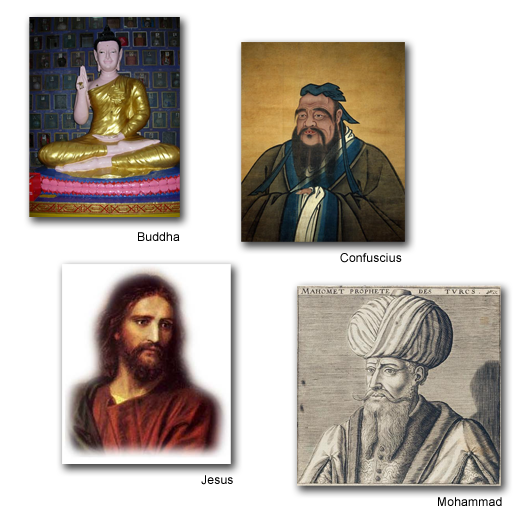
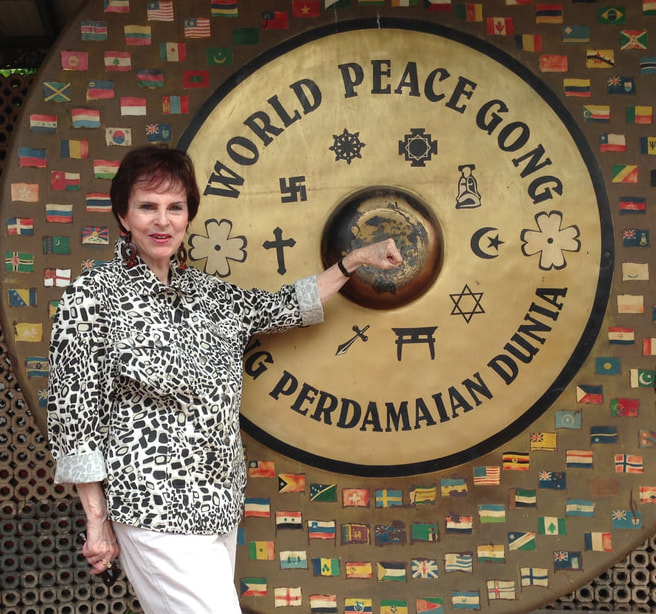
 RSS Feed
RSS Feed